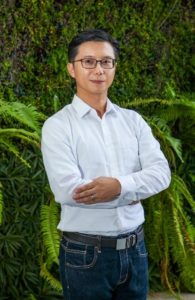 Dr. Lin received his Ph.D. from the Department of Earth and Environmental Engineering at Columbia University (USA). He is currently working as a Distinguished Professor in the Department of Environmental Engineering. His research focuses on development of advanced materials and catalysts for energy and environmental applications. In the past few years, he has been becoming one of leading experts for environmental applications of metal organic frameworks (MOFs) and their derivatives. He has also served as editors and editorial members for more than 10 journals. Dr. Lin has co-authored more than 365 SCI journal papers with a H-index of 58 and more than 12700 citations. From February 2024, Prof. Lin will join the Institute of Analytic and Environmental Sciences at National Tsing Hua University (Hsinchu City, Taiwan).
Dr. Lin received his Ph.D. from the Department of Earth and Environmental Engineering at Columbia University (USA). He is currently working as a Distinguished Professor in the Department of Environmental Engineering. His research focuses on development of advanced materials and catalysts for energy and environmental applications. In the past few years, he has been becoming one of leading experts for environmental applications of metal organic frameworks (MOFs) and their derivatives. He has also served as editors and editorial members for more than 10 journals. Dr. Lin has co-authored more than 365 SCI journal papers with a H-index of 58 and more than 12700 citations. From February 2024, Prof. Lin will join the Institute of Analytic and Environmental Sciences at National Tsing Hua University (Hsinchu City, Taiwan).
Read Kun-Yi Andrew Lin ’s Emerging Investigator article “Enhancing Degradation of Ciprofloxacin in Water using Oxone activated by Urchin-like Cubic and Hollow-structured Cobalt@N-doped Carbon prepared via Etching-Engineering” and read more about him in the interview below:
Your recent Emerging Investigator Series paper focuses on Enhancing Degradation of Ciprofloxacin in Water using Oxone activated by Urchin-like Cubic and Hollow-structured Cobalt@N-doped Carbon prepared via Etching-Engineering: A. How has your research evolved from your first article to this most recent article?
As I was trained as an environmental chemical engineer, I have been focusing the development of functional materials to respond to environmental issues and challenges from chemical and material perspectives. In my very first publication, I integrated organic-inorganic hybrid materials to combine advantages of organic soft matters and inorganic solid particles for capturing CO2. Similarly, for affording synergistic effects, the current study further utilizes benefits of inorganic metals and organic carbonaceous substrates to formulate this hybrid material comprised of cobalt embedded onto N-doped carbon with an intriguing hollow morphology in order to maximize active surfaces of catalysts.
What aspect of your work are you most excited about at the moment?
At this moment, I am quite fascinated by metal-organic frameworks (MOFs) that are a versatile platform for various applications. MOFs can be also tuned to become tools for dealing with conventional and emerging environmental problems.
In your opinion, what are the most important questions to be asked/answered in this field of research?
While designing and developing nanomaterials is interesting and promising, practical applications using nanomaterials would still encounter challenges in reality. Therefore, it is crucial to consider both reality and fancy to develop materials that can be feasibly implemented and operated in practical applications and still retain advantages of nanoscale features.
What do you find most challenging about your research?
The most challenging part of my current research is to integrate fundamental/theoretical perspectives with experimental investigations as the quantum computational chemistry is increasingly adopted as a useful tool to elucidate materials sciences. However, proper applications of quantum computational chemistry for understanding materials science and relationships between materials and reactions would be still quite challenging.
In which upcoming conferences or events may our readers meet you?
I will plan to attend conferences related to chemistry and chemical engineering. Therefore, it may be possible to meet up together at conferences held by American Chemical Society or Royal Society of Chemistry.
How do you spend your spare time?
I like to spend my spare time hanging out with my family to explore natural scenes and I also like to cook to prepare nice cuisines for my family!
Which profession would you choose if you were not a scientist?
If I were not a scientist, I probably would be an industrial designer to design vehicles or shoes to exercise my creativity and imagination.
Can you share one piece of career-related advice or wisdom with other early career scientists?
“No pain, no gain!” The academia is actually very competitive and you are competing with so many talented peers. Therefore, you need to really devote yourself and work hard to achieve your goals!










